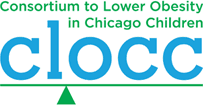by Elizabeth Katta, Meredith Jones, and Carolyn Jillson, Guest Bloggers
For the past two years, CLOCC has served as a 9-month practicum site for Master of Public Health students from DePaul University. After participating in an application and interview process, the students are matched with a position and site supervisor. This year, we hosted three talented students: Elizabeth Katta, Evaluation Intern; Meredith Jones, Schools Intern; and Carolyn Jillson, Advocacy Programs Intern. We are very grateful for their contribution to our work and their reflections below demonstrate the experience was also meaningful for each student.
Elizabeth Katta – As CLOCC’s Research and Evaluation intern, I was excited to see how a data driven organization conducts research and shares its results with Chicago partners. Working with Dr. Maryann Mason, Community and Evaluation Research Director, and Sarah Welch, Evaluation Manager, provided me the opportunity to take part in various activities within the Consortium, including data collection, community trainings, and organizational meetings. One of my favorite experiences was a SOPLAY (System for Observing Play and Leisure Activity in Youth) training at the Chicago Children’s Museum at Navy Pier. Sarah, Becca Calendo (CLOCC’s Health Educator) and I demonstrated a simple method to quantify activity in enclosed spaces. The fun, interactive activity demonstrated the Consortium’s dedication to providing useful services to their community partners. The bulk of my time at CLOCC was spent collecting data for my Capstone thesis, centered on an evaluation of CLOCC’s first breastfeeding study with the PCC Wellness clinic in the Austin community. I was able to see how community-based research is conducted as well have an opportunity to exercise my developing public health skills. My practicum time was invaluable because of these opportunities, and I hope to build upon the skills that CLOCC has helped me develop.
Meredith Jones – Serving as the School Systems Intern at CLOCC over the past year has afforded me the opportunity to understand the challenges and triumphs Chicago schools, teachers, principals, and PE teachers experience in sustaining a healthy classroom. Specifically through the Healthy Teacher Network, I enhanced practical skills such as event coordination and organized networking, evaluative skills when constructing instruments for program and workshop evaluation, and data collection and analysis as I compiled and streamlined large amounts of data on schools, individual teachers, and Chicago communities. Getting to know the structure and admirable objectives of the Healthy Teacher Network , which provides an environment conducive to teacher training and the exchange of valuable ideas for educators to use in their classrooms, will aid in my practice as a public health practitioner concerned with examining the structural determinants of health and coming to solutions for my community. The highlight of my time with CLOCC and the School Systems Working Group was the opportunity to interact directly with Chicago teachers who are passionate about implementing health-based strategies like physical activity breaks and nutrition education in their classrooms in order to improve the lives of their students. Their energy and devotion to the Healthy Teacher Network and CLOCC’s mission is truly contagious and emphatic.
Carolyn Jillson – I have really enjoyed working with CLOCC for my practicum at DePaul. I worked with Christine Bozlak, CLOCC’s Advocacy Program Manager, who provides technical assistance to the City of Chicago Inter-Departmental Task Force on Childhood Obesity (IDTF). I worked with CLOCC and IDTF to create a business plan for an IDTF Wellness Campus, a community-level intervention to coordinate and improve programing to improve health outcomes in neighborhoods with an especially high prevalence of childhood obesity. I found this project challenging, in that it required a big picture vision while I had to stay focused on the limitations of what is actually feasible. I learned a great deal about environmental approaches to complex health problems. Through this project I also became more familiar with a variety of governmental agency programs and partnerships and I was encouraged by the variety of effective and innovative programs and services currently being implemented in Chicago.
Thanks to our great DePaul practicum students for your enthusiasm, dedication, and hard work! For more information on the Master of Public Health program at DePaul University, visit their website.


